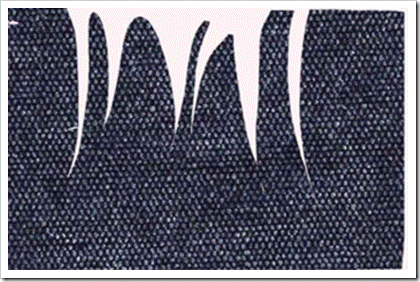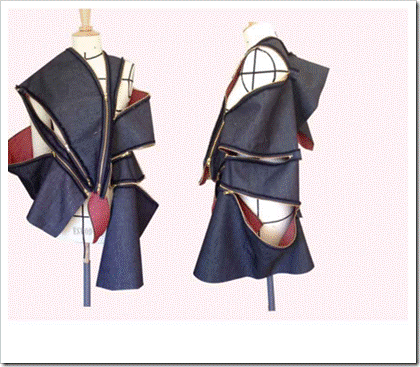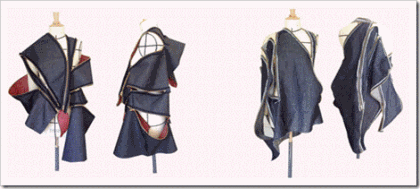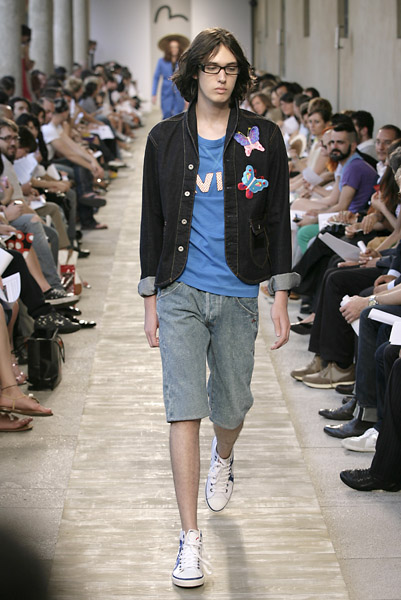The London College of Fashion MA Fashion Futures course launched a project on speculative and futuristic denim apparel based on sustainable denim, which was supported by The Sustainable Angle, a non-profit body from UK and Kassim Textiles (Pakistan).Through the Future Fabrics Expo, The Sustainable Angle facilitated the sponsorship of the latest project from LCF’s MA Fashion Futures course, and sponsored by Kassim Textiles.This is a project that exercised the practice of speculative design. The aim of the project was to use design as a media to catalyze social discussion and debate over what life could be in the near future, to explore how to create clothes that make people think.
One of the student’s projects contemplated using five steps to achieve that (Image credits – all images are from Caroline Yan Zheng’s (student at LCF ) project ‘Wearable Data’)
1. Choose Data
According to RAY KURZWEIL (author of the singularity is near) the average $1,000 laptop should be computing at the rate of the human brain in fewer than 9 years (that is the year 2023). Fast-forward another 23 years (that is the year 2043). and average $1,000 laptop is performing 100 million billion billion calculations per second – which would be equivalent to all the brains of the entire human race.
2. Visualize Data
3. Create Pattern for cutting and moulage
4. Create forms on body & experiment on finishing
5. Creating The Final Designs
Futuristic designs were created using the sustainable fabrics from Kassim Denim.
We spoke to the Project Manager of The Sustainable Angle – Charlotte Turner, and London College Of Fashion MA Futures student Caroline Yan Zheng to understand what was the concept behind the whole project and how they see it contributing in influencing denim designs in coming times.
1. How was this project conceived and what was the idea behind it
Charlotte Turner, The Sustainable Angle –
The Sustainable Angle have been working with educational establishments including the London College of Fashion and the Royal College of Art over recent years, to provide students with the opportunity to experience and learn about sustainable textiles. When the London College of Fashion MA Fashion Futures course leader approached us to set up a collaborative project, we thought that it was a great opportunity to bring in Kassim, a company with a strong commitment to becoming more sustainable, and engaging with students, our future industry leaders.
Caroline Yan Zheng –
Practicing speculative design is a major theme in my master degree studies. So this project is part of my practice to raise social reflections using fashion design. The question behind this project is to question the relation of science and technology, humanities and human identity, to raise the reflection of ‘are we ready to cope with the overwhelming development and smartness of artificial intelligence’.
2. How do you think sustainability is a pillar of the project?
Charlotte Turner, The Sustainable Angle –
Within this project, each student had the space to explore what sustainability means to them, and to decide how to investigate and communicate this through their work. Sustainability should be inherently present in everything we do, and this project allowed the students to visualize their ideas in relation to sustainability in fashion and textiles, providing them with a platform to share it outside of the studio.
Caroline Yan Zheng –
Sustainability for me is not merely using sustainable material or up-cycling. Designers as the creators of things need to initiate from sustainable thinking. Asking questions and being speculative is a critical start of creating sustainability. Of course, as an embodiment of the concept, sustainable fabrics enhance the message.
3. Do you think in near future consumers might be strongly attracted by the sustainability mantra?
Charlotte Turner, The Sustainable Angle –
We are already seeing a growing interest and concern about sustainability in fashion and textiles, as well as in other areas of design and production. At The Sustainable Angle we are seeing this first hand via the increasing number of visitors to the Future Fabrics Expo each year, attending to find out more about the latest developments in sustainable fashion and textiles, and through interest from all levels of the market for workshops on integrating sustainable thinking and sustainable textiles in to their collections. This is led in part by consumer demand, and partly by an industry that knows it must reduce it’s negative environmental and social impact now.
Caroline Yan Zheng –
Yes, absolutely. But it won¹t be limited to a showcase of a series of products marketed as sustainable, it will be sustainable thinking and sustainable lifestyle. This is not only to maintain the environment we live in but also to sustain human identity.
4. Your designs are very futuristic. Why do you think consumers could go for such designs?
Caroline Yan Zheng –
For people who are thoughtful and reflective, this type of design will echo their ideas. Instead of being dressed in trendy fashion whose standard of beauty is defined by others for a surface value, to dress to be reminded to reflect or to demonstrate personal messages is definitely appealing for many.
We also spoke to Sohail Ahmed at KassimDenim to take their views on this project :
a) What was the the thought behind to promote this project by Kassim Textiles?
We at Kassim textiles always believe in progress, and on this belief when we were approached by The Sustainable Angle to assist the students of LCF, we felt obligated to participate in these projects. This was our way of helping out future tex-perts complete their studies and step into the real world.
b) How do you think the consumer can be made aware of the fabric part of sustainability?
The enlightened consumer of today is aware of the eco situation with drastic changes in the climate, problems in the water resources etc. hence they tend to be more cautious of what they buy. The less enlightened consumers group is either unaware or has lack of empathy, and organizations like The Sustainable Angle educate these masses, reaching out to them with online literatures, lectures, expos etc. and then we ,as producers ,should play our role in supporting such organizations in every possible way.
c) Do you envisage a major changes in apparel designs to take care of sustainability aspect ?
It has been slow, but yes the trend towards sustainability is now becoming a big factor in the textile industry and apparel designs, and I believe that in not the distant future, sustainability will be the major factor.
About
The Sustainable Angle is an award winning not for profit organization which initiates and supports projects which contribute to minimizing the environmental impact of industry and society. Their biggest project to date, the Future Fabrics Expo focuses on the fashion industry and how its environmental impact can be lowered through innovation in the textile industry, and novel ideas to transform the fashion system and design practice.
Fashion SVP is a fashion manufacturing sourcing event comprising an exhibition showcase and industry seminars, presenting retail, brand and wholesaler/importer buyers with local region producers (UK, European and Mediterranean) of casual and formal fashion garments, workwear, outdoor wear and accessories. Launched in 2011, the show is currently co-located with the established fashion stock event, Off-Price Show London.
Kassim Textiles (Pakistan) use primarily natural fibres to create their denims, combining certified organic cotton with linen and cellulosic fibres to create diverse denims for the international fashion market. The company has achieved a wide range of internationally recognized environmental certifications including GOTS, Oeko-Tex, and OE100, and will have a range of their denims showcased in the 4th Future Fabrics Expo on 28th – 30th September 2014 at Fashion SVP, London.
MA Fashion Futures at the London College of Fashion is a ground-breaking design course at the London College of Fashion that combines practice with theory to evolve sustainable solutions for the fashion industry.









